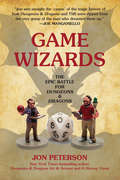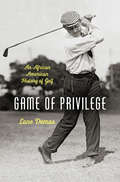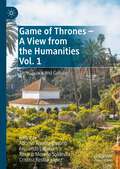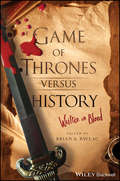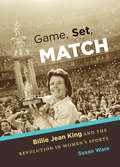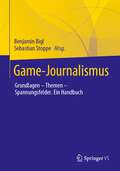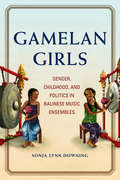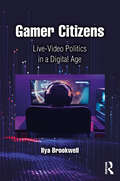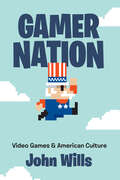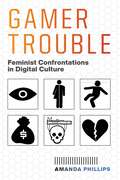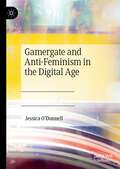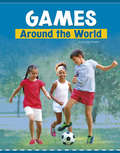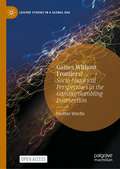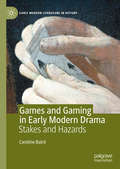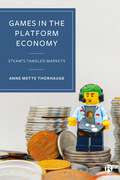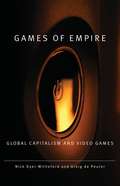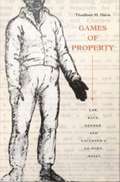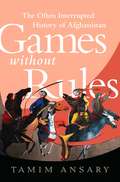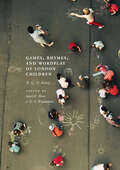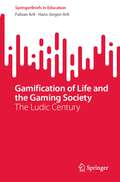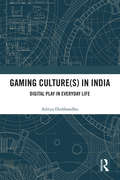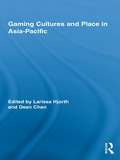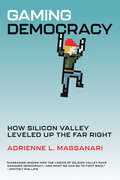- Table View
- List View
Game Wizards: The Epic Battle for Dungeons & Dragons (Game Histories)
by Jon PetersonThe story of the arcane table-top game that became a pop culture phenomenon and the long-running legal battle waged by its cocreators.When Dungeons & Dragons was first released to a small hobby community, it hardly seemed destined for mainstream success--and yet this arcane tabletop role-playing game became an unlikely pop culture phenomenon. In Game Wizards, Jon Peterson chronicles the rise of Dungeons & Dragons from hobbyist pastime to mass market sensation, from the initial collaboration to the later feud of its creators, Gary Gygax and Dave Arneson. As the game's fiftieth anniversary approaches, Peterson--a noted authority on role-playing games--explains how D&D and its creators navigated their successes, setbacks, and controversies.Peterson describes Gygax and Arneson's first meeting and their work toward the 1974 release of the game; the founding of TSR and its growth as a company; and Arneson's acrimonious departure and subsequent challenges to TSR. He recounts the "Satanic Panic" accusations that D&D was sacrilegious and dangerous, and how they made the game famous. And he chronicles TSR's reckless expansion and near-fatal corporate infighting, which culminated with the company in debt and overextended and the end of Gygax's losing battle to retain control over TSR and D&D.With Game Wizards, Peterson restores historical particulars long obscured by competing narratives spun by the one-time partners. That record amply demonstrates how the turbulent experience of creating something as momentous as Dungeons & Dragons can make people remember things a bit differently from the way they actually happened.
Game of Privilege: An African American History of Golf (The John Hope Franklin Series in African American History and Culture)
by Lane DemasThis groundbreaking history of African Americans and golf explores the role of race, class, and public space in golf course development, the stories of individual black golfers during the age of segregation, the legal battle to integrate public golf courses, and the little-known history of the United Golfers Association (UGA)--a black golf tour that operated from 1925 to 1975. Lane Demas charts how African Americans nationwide organized social campaigns, filed lawsuits, and went to jail in order to desegregate courses; he also provides dramatic stories of golfers who boldly confronted wider segregation more broadly in their local communities. As national civil rights organizations debated golf's symbolism and whether or not to pursue the game's integration, black players and caddies took matters into their own hands and helped shape its subculture, while UGA participants forged one of the most durable black sporting organizations in American history as they fought to join the white Professional Golfers' Association (PGA). From George F. Grant's invention of the golf tee in 1899 to the dominance of superstar Tiger Woods in the 1990s, this revelatory and comprehensive work challenges stereotypes and indeed the fundamental story of race and golf in American culture.
Game of Privilege: An African American History of Golf (The John Hope Franklin Series in African American History and Culture)
by Lane DemasThis groundbreaking history of African Americans and golf explores the role of race, class, and public space in golf course development, the stories of individual black golfers during the age of segregation, the legal battle to integrate public golf courses, and the little-known history of the United Golfers Association (UGA)--a black golf tour that operated from 1925 to 1975. Lane Demas charts how African Americans nationwide organized social campaigns, filed lawsuits, and went to jail in order to desegregate courses; he also provides dramatic stories of golfers who boldly confronted wider segregation more broadly in their local communities. As national civil rights organizations debated golf’s symbolism and whether or not to pursue the game’s integration, black players and caddies took matters into their own hands and helped shape its subculture, while UGA participants forged one of the most durable black sporting organizations in American history as they fought to join the white Professional Golfers’ Association (PGA). From George F. Grant’s invention of the golf tee in 1899 to the dominance of superstar Tiger Woods in the 1990s, this revelatory and comprehensive work challenges stereotypes and indeed the fundamental story of race and golf in American culture.
Game of Thrones - A View from the Humanities Vol. 1: Time, Space and Culture
by Cristina Rosillo-López Alfonso Álvarez-Ossorio Fernando Lozano Rosario Moreno SoldevilaThis book reflects on time, space and culture in the Game of Thrones universe. It analyses both the novels and the TV series from a multidisciplinary perspective ultimately aimed at highlighting the complexity, eclecticism and diversity that characterises Martin’s world. The book is divided into three thematic sections. The first section focuses on space—both the urban and natural environment—and the interaction between human beings and their surroundings. The second section follows different yet complementary approaches to Game of Thrones from an aesthetic and cultural perspective. The final section addresses the linguistic and translation implications of the Game of Thrones universe, as well as its didactic uses. This book is paired with a second volume that focuses on the characters that populate Martin’s universe, as well as on one of the ways in which they often interact—violence and warfare—from the same multidisciplinary perspective.
Game of Thrones versus History: Written in Blood
by Brian A. PavlacSince it first aired in 2011, Game of Thrones galloped up the ratings to become the most watched show in HBO’s history. It is no secret that creator George R.R. Martin was inspired by late 15th century Europe when writing A Song of Ice and Fire, the sprawling saga on which the show is based. Aside from the fantastical elements, Game of Thrones really does mirror historic events and bloody battles of medieval times—but how closely?Game of Thrones versus History: Written in Blood is a collection of thought-provoking essays by medieval historians who explore how the enormously popular HBO series and fantasy literature of George R. R. Martin are both informed by and differ significantly from real historical figures, events, beliefs, and practices of the medieval world. From a variety of perspectives, the authors delve into Martin’s plots, characterizations, and settings, offering insights into whether his creations are historical possibilities or pure flights of fantasy. Topics include the Wars of the Roses, barbarian colonizers, sieges and the nature of medieval warfare, women and agency, slavery, celibate societies in Westeros, myths and legends of medieval Europe, and many more. While life was certainly not a game during the Middle Ages, Game of Thrones versus History: Written in Blood reveals how a surprising number of otherworldly elements of George R. R. Martin’s fantasy are rooted deeply in the all-too-real world of medieval Europe. Find suggested readings, recommended links, and more from editor Brian Pavlac at gameofthronesversushistory.com.
Game, Set, Match: Billie Jean King and the Revolution in Women's Sports
by Susan WareWhen Billie Jean King trounced Bobby Riggs in tennis's "Battle of the Sexes" in 1973, she placed sports squarely at the center of a national debate about gender equity. In this winning combination of biography and history, Susan Ware argues that King's challenge to sexism, the supportive climate of second-wave feminism, and the legislative clout of Title IX sparked a women's sports revolution in the 1970s that fundamentally reshaped American society. While King did not single-handedly cause the revolution in women's sports, she quickly became one of its most enduring symbols, as did Title IX, a federal law that was initially passed in 1972 to attack sex discrimination in educational institutions but had its greatest impact by opening opportunities for women in sports. King's place in tennis history is secure, and now, withGame, Set, Match, she can take her rightful place as a key player in the history of feminism as well. By linking the stories of King and Title IX, Ware explains why women's sports took off in the 1970s and demonstrates how giving women a sporting chance has permanently changed American life on and off the playing field.
Game-Journalismus: Grundlagen – Themen – Spannungsfelder. Ein Handbuch
by Benjamin Bigl Sebastian StoppeDas Handbuch „Game-Journalismus“ bespricht erstmalig im deutschsprachigen Raum ein wenig beachtetes journalistisches Berufsfeld. Es führt kompakt in die Grundlagen des Game-Journalismus sowie dessen Entwicklung und Ausdifferenzierung ein und bespricht Trends und Herausforderungen für Journalismus, Spielerinnen und Spieler. Der Band zeigt die Vielfalt des Berufsfelds in den unterschiedlichen Mediengattungen und -formen, denn Games haben nicht nur einen festen Platz in der Kultur-, Wissenschafts- und Technikberichterstattung. Games und Phänomene der Computerspielekultur werden zunehmend auch in Online-Magazinen, professionellen und privaten Blogs, Podcasts und Video-Kanälen behandelt. Laien machen als Game-Influencer den etablierten Berufsfeldern Konkurrenz. Ausführlich werden Spannungsfelder reflektiert, mit denen Game-Journalisten konfrontiert werden und in denen sie agieren. Zudem werden aktuelle Befunde, Anforderungen des Jugendschutzes und des Urheberrechts, Monetarisierungsstrategien, die Veränderungen der Medienlandschaft sowie neue Vermittler und deren kreative Nutzerprodukte dargestellt und Vorschläge für die Aus- und Weiterbildung vom Game-Journalisten unterbreitet. Das Buch bietet sowohl wissenschaftliche als auch praktische Perspektiven auf eine vielfältige Publikationslandschaft und ist als ein Beitrag zur Erforschung des Game-Journalismus konzipiert.
Game: Animals, Video Games, and Humanity
by Tom TylerA playful reflection on animals and video games, and what each can teach us about the other Video games conjure new worlds for those who play them, human or otherwise: they&’ve been played by cats, orangutans, pigs, and penguins, and they let gamers experience life from the perspective of a pet dog, a predator or a prey animal, or even a pathogen. In Game, author Tom Tyler provides the first sustained consideration of video games and animals and demonstrates how thinking about animals and games together can prompt fresh thinking about both.Game comprises thirteen short essays, each of which examines a particular video game, franchise, aspect of gameplay, or production in which animals are featured, allowing us to reflect on conventional understandings of humans, animals, and the relationships between them. Tyler contemplates the significance of animals who insert themselves into video games, as protagonists, opponents, and brute resources, but also as ciphers, subjects, and subversive guides to new ways of thinking. These animals encourage us to reconsider how we understand games, contesting established ideas about winning and losing, difficulty settings, accessibility, playing badly, virtuality, vitality and vulnerability, and much more.Written in a playful style, Game draws from a dizzying array of sources, from children&’s television, sitcoms, and regional newspapers to medieval fables, Shakespearean tragedy, and Edwardian comedy; from primatology, entomology, and hunting and fishing manuals to theological tracts and philosophical treatises. By examining video games through the lens of animals and animality, Tyler leads us to a greater humility regarding the nature and status of the human creature, and a greater sensitivity in dealings with other animals.
Gamelan Girls: Gender, Childhood, and Politics in Balinese Music Ensembles (New Perspectives on Gender in Music)
by Sonja Lynn DowningIn recent years, girls' and mixed-gender ensembles have challenged the tradition of male-dominated gamelan performance. The change heralds a fundamental shift in how Balinese think about gender roles and the gender behavior taught in children's music education. It also makes visible a national reorganization of the arts taking place within debates over issues like women's rights and cultural preservation. Sonja Lynn Downing draws on over a decade of immersive ethnographic work to analyze the ways Balinese musical practices have influenced the processes behind these dramatic changes. As Downing shows, girls and young women assert their agency within the gamelan learning process to challenge entrenched notions of performance and gender. One dramatic result is the creation of new combinations of femininity, musicality, and Balinese identity that resist messages about gendered behavior from the Indonesian nation-state and beyond. Such experimentation expands the accepted gender aesthetics of gamelan performance but also sparks new understanding of the role children can and do play in ongoing debates about identity and power.
Gamer Citizens: Live-Video Politics in a Digital Age
by Ilya BrookwellThis book examines the politics of being a gamer in the digital age withan in-depth study of the communities of gamers who populate live-videostreaming sites.This text offers an innovative theoretical and methodological study ofgamers in their community. It explores gamers as citizens and asks how gamersare political in view of their activities on stream. Ilya Brookwell examineshow gamers live out their daily lives on live-video streams and how they usetheir associated new platforms and tools, including live-video streams such asTwitch.tv and online web fora, to engage with “live-video politics”. It exploresthe relationship between gamers, gaming, and streaming, highlighting howgamers develop a notion of self that is fundamentally located in community.Gamers consequently create, inhabit, as well as inherit a political world. Withstreaming communities offering unique insights into what it means to live ina digital age, the book explores how gamers find hopeful openings, as well aslimits, through streaming. The book highlights how gamers can take an activerole in politics and democracy in a digital age.Interesting reading for undergraduate students, postgraduate researchers,and academics of media, cultural and communication studies, video gamestudies, and digital media studies.
Gamer Nation: Video Games and American Culture
by John WillsExplores how games actively influence the ways people interpret and relate to American life.In 1975, design engineer Dave Nutting completed work on a new arcade machine. A version of Taito's Western Gun, a recent Japanese arcade machine, Nutting's Gun Fight depicted a classic showdown between gunfighters. Rich in Western folklore, the game seemed perfect for the American market; players easily adapted to the new technology, becoming pistol-wielding pixel cowboys. One of the first successful early arcade titles, Gun Fight helped introduce an entire nation to video-gaming and sold more than 8,000 units.In Gamer Nation, John Wills examines how video games co-opt national landscapes, livelihoods, and legends. Arguing that video games toy with Americans' mass cultural and historical understanding, Wills show how games reprogram the American experience as a simulated reality. Blockbuster games such as Civilization, Call of Duty, and Red Dead Redemption repackage the past, refashioning history into novel and immersive digital states of America. Controversial titles such as Custer's Revenge and 08.46 recode past tragedies. Meanwhile, online worlds such as Second Life cater to a desire to inhabit alternate versions of America, while Paperboy and The Sims transform the mundane tasks of everyday suburbia into fun and addictive challenges.Working with a range of popular and influential games, from Pong, Civilization, and The Oregon Trail to Grand Theft Auto, Silent Hill, and Fortnite, Wills critically explores these gamic depictions of America. Touching on organized crime, nuclear fallout, environmental degradation, and the War on Terror, Wills uncovers a world where players casually massacre Native Americans and Cold War soldiers alike, a world where neo-colonialism, naive patriotism, disassociated violence, and racial conflict abound, and a world where the boundaries of fantasy and reality are increasingly blurred. Ultimately, Gamer Nation reveals not only how video games are a key aspect of contemporary American culture, but also how games affect how people relate to America itself.
Gamer Trouble: Feminist Confrontations in Digital Culture
by Amanda PhillipsComplicating perspectives on diversity in video gamesGamers have been troublemakers as long as games have existed. As our popular understanding of “gamer” shifts beyond its historical construction as a white, straight, adolescent, cisgender male, the troubles that emerge both confirm and challenge our understanding of identity politics. In Gamer Trouble, Amanda Phillips excavates the turbulent relationships between surface and depth in contemporary gaming culture, taking readers under the hood of the mechanisms of video games in order to understand the ways that difference gets baked into its technological, ludic, ideological, and social systems.By centering the insights of queer and women of color feminisms in readings of online harassment campaigns, industry animation practices, and popular video games like Portal and Mass Effect, Phillips adds essential analytical tools to our conversations about video games. She embraces the trouble that attends disciplinary crossroads, linking the violent hate speech of trolls and the representational practices marginalizing people of color, women, and queers in entertainment media to the dehumanizing logic undergirding computation and the optimization strategies of gameplay. From the microcosmic level of electricity and flicks of a thumb to the grand stages of identity politics and global capitalism, wherever gamers find themselves, gamer trouble follows. As reinvigorated forms of racism, sexism, and homophobia thrive in games and gaming communities, Phillips follows the lead of those who have been making good trouble all along, agitating for a better world.
Gamergate and Anti-Feminism in the Digital Age
by Jessica O'DonnellThis book provides an in-depth, feminist and sociological analysis of Gamergate, a major social movement and anti-feminist harassment campaign. Gamergate provides a clear example of both how a modern anti-feminist ‘backlash’ is enacted, and how feminists in the digital age respond. Chapters connect Gamergate to the broader Men’s Rights Activism (MRA) political movement, examining men’s anxieties surrounding what they see as an erosion of male privilege, their conflation of privilege with rights, as well as their use of social media to harass and attack women as a response to their perceived oppression. Likewise, the author analyses the online strategies used by feminists to respond to this backlash, how social media is harnessed to build a feminist movement, the effectiveness of these online strategies, and the parallels that these actions have with those from previous waves of feminism. Finally, the author reflects on what has changed with regards to MRA, online harassment, and digital feminism after the height of Gamergate.This book will be of interest to scholars in Gender Studies, Sociology, and Media Studies.
Games Around the World (Customs Around the World)
by Lindsay ShafferWhat do tic-tac-toe, Pilolo, and hookey have in common? They're all games! Find out what people play around the world in this engaging series that develops kids' understanding of our diverse global community and their place in it. What game will you play next?
Games Without Frontiers?: Socio-historical Perspectives at the Gaming/Gambling Intersection (Leisure Studies in a Global Era)
by Heather WardleThis open access book focuses on how and why digital games and gambling are increasingly intertwined and asks “does this matter?” Looking at how “loot boxes” became the poster child for the convergence of gambling and gaming, Wardle traces how we got here. She argues that the intersection between gambling and gaming cultures has a long lineage, one that can be traced back throughout the 20th century but also incorporates more recent trends like the poker boom of the 1990s, the development of social media gambling products and the development of skin betting markets. Underpinned by changing technology, which facilitated new ways to bet, trade and play, the intersection between gaming and gambling cultures and products has accelerated within the last decade – and shows little signs of stopping. Wardle explores what this means for our understanding of risk, how gaming and gambling entities use each other for commercial advantage, and crucially explores what young people think of this, before making recommendations for action.
Games and Gaming in Early Modern Drama: Stakes and Hazards (Early Modern Literature in History)
by Caroline BairdThis book is a close taxonomic study of the pivotal role of games in early modern drama. The presence of the game motif has often been noticed, but this study, the most comprehensive of its kind, shows how games operate in more complex ways than simple metaphor and can be syntheses of emblem and dramatic device. Drawing on seventeenth-century treatises, including Francis Willughby’s Book of Games, which only became available in print in 2003, and divided into chapters on Dice, Cards, Tables (Backgammon), and Chess, the book brings back into focus the symbolism and divinatory origins of games. The work of more than ten dramatists is analysed, from the Shakespeare and Middleton canon to rarer plays such as The Spanish Curate, The Two Angry Women of Abington and The Cittie Gallant. Games and theatre share common ground in terms of performance, deceit, plotting, risk and chance, and the early modern playhouse provided apt conditions for vicarious play. From the romantic chase to the financial gamble, and in legal contest and war, the twenty-first century is still engaging the game. With its extensive appendices, the book will appeal to readers interested in period games and those teaching or studying early modern drama, including theatre producers, and awareness of the vocabulary of period games will allow further references to be understood in non-dramatic texts.
Games in the Platform Economy: Steam's Tangled Markets
by Anne Mette ThorhaugeThis book examines the evolution of digital platform economies through the lens of online gaming. Offering valuable empirical work on Valve’s ‘Steam’ platform, Thorhauge examines the architecture of this global online videogame marketplace and the way it enables new markets and economic transactions. Drawing on infrastructure, software, platform and game studies, the book interrogates the implications of these transactions, both in terms of their legality, but also in how they create new forms of immaterial labour. Shedding new light on a previously under-explored branch of the study of digital platforms, this book brings a unique economic sociology perspective into the growing literature on videogame studies.
Games of Empire: Global Capitalism and Video Games (Electronic Mediations #29)
by Nick Dyer-Witheford Greig de PeuterIn the first decade of the twenty-first century, video games are an integral part of global media culture, rivaling Hollywood in revenue and influence. No longer confined to a subculture of adolescent males, video games today are played by adults around the world. At the same time, video games have become major sites of corporate exploitation and military recruitment.In Games of Empire, Nick Dyer-Witheford and Greig de Peuter offer a radical political critique of such video games and virtual environments as Second Life, World of Warcraft, and Grand Theft Auto, analyzing them as the exemplary media of Empire, the twenty-first-century hypercapitalist complex theorized by Michael Hardt and Antonio Negri. The authors trace the ascent of virtual gaming, assess its impact on creators and players alike, and delineate the relationships between games and reality, body and avatar, screen and street. Games of Empire forcefully connects video games to real-world concerns about globalization, militarism, and exploitation, from the horrors of African mines and Indian e-waste sites that underlie the entire industry, the role of labor in commercial game development, and the synergy between military simulation software and the battlefields of Iraq and Afghanistan exemplified by Full Spectrum Warrior to the substantial virtual economies surrounding World of Warcraft, the urban neoliberalism made playable in Grand Theft Auto, and the emergence of an alternative game culture through activist games and open-source game development.Rejecting both moral panic and glib enthusiasm, Games of Empire demonstrates how virtual games crystallize the cultural, political, and economic forces of global capital, while also providing a means of resisting them.
Games of Property: Law, Race, Gender, and Faulkner's Go Down, Moses
by Thadious M. DavisIn Games of Property, distinguished critic Thadious M. Davis provides a dazzling new interpretation of William Faulkner's Go Down, Moses. Davis argues that in its unrelenting attention to issues related to the ownership of land and people, Go Down, Moses ranks among Faulkner's finest and most accomplished works. Bringing together law, social history, game theory, and feminist critiques, she shows that the book is unified by games--fox hunting, gambling with cards and dice, racing--and, like the law, games are rule-dependent forms of social control and commentary. She illuminates the dual focus in Go Down, Moses on property and ownership on the one hand and on masculine sport and social ritual on the other. Games of Property is a masterful contribution to understandings of Faulkner's fiction and the power and scope of property law.
Games without Rules: The Often-Interrupted History of Afghanistan
by Tamim AnsaryToday, most Westerners still see the war in Afghanistan as a contest between democracy and Islamist fanaticism. That war is real; but it sits atop an older struggle, between Kabul and the countryside, between order and chaos, between a modernist impulse to join the world and the pull of an older Afghanistan: a tribal universe of village republics permeated by Islam.<P><P> Now, Tamim Ansary draws on his Afghan background, Muslim roots, and Western and Afghan sources to explain history from the inside out, and to illuminate the long, internal struggle that the outside world has never fully understood. It is the story of a nation struggling to take form, a nation undermined by its own demons while, every 40 to 60 years, a great power crashes in and disrupts whatever progress has been made. Told in conversational, storytelling style, and focusing on key events and personalities, Games without Rules provides revelatory insight into a country at the center of political debate.
Games, Rhymes, and Wordplay of London Children
by N. G. KelseyThis book presents a unique annotated collection of some 2000 playground games, rhymes, and wordplay of London children. It charts continuity and development in childlore at a time of major social and cultural change and offers a detailed snapshot of changes in the traditions and language of young people. Topics include: starting a game; counting-out rhymes; games (without songs); singing and chanting games; clapping, skipping, and ball bouncing games; school rhymes and parodies; teasing and taunting; traditional belief and practice; traditional wordplay; and a concluding miscellany. Recorded mainly in the 1980s by primary schoolteacher Nigel Kelsey, transcribed verbatim from the children’s own words, and accompanied by extensive commentaries and annotation, the book sets a wealth of new information in the wider historical and contemporary context of existing studies in Britain, Ireland, and other parts of the English-speaking world. This valuable new resource will open new avenues for research and be of particular interest to folklorists and linguists, as well as to those working across the full spectrum of social, cultural, and educational studies.
Gamification of Life and the Gaming Society: The Ludic Century (SpringerBriefs in Education)
by Hans-Jürgen Arlt Fabian ArltThis interesting book discusses why, as an activity, topic and metaphor, play and game have become an integral part of modern life. Empirically exemplary and theoretically grounded, this book discusses the developments and expansions in gaming, from easily accessible casual games to the galaxy-spanning gaming worlds of Massively Multiplayer Online Role-Playing Games (MMORPGs). It shows how gaming has become a focal point of the entertainment industry, marked by boundless professionalization and monetization, especially in the realm of sports, and how games become global platforms for social networks, where players from all over the world meet in digital sandboxes. The combination of the virtual and the ludic creates hyperreal spaces in which people try out new forms of interaction, cooperation, and even brainstorming. The authors ask if this behavior has become the new way of life and the new normal, and if this heralds the ludic century. They take readers on a journey to understand the dynamics of today's gaming society, and base their observations and analyses on an original theory of play, which, in contrast to social normalcy, revolves around the allure and threats of the unexpected. This book is of interest to students and researchers of social science and communication studies, especially those working on the interface of AI and society.
Gaming Culture(s) in India: Digital Play in Everyday Life
by Aditya DeshbandhuThis volume critically analyzes the multiple lives of the "gamer" in India. It explores the "everyday" of the gaming life from the player’s perspective, not just to understand how the games are consumed but also to analyze how the gamer influences the products’ many (virtual) lives. Using an intensive ethnographic approach and in-depth interviews, this volume situates the practice of gaming under a broader umbrella of digital leisure activities and foregrounds the proliferation of gaming as a new media form and cultural artifact; critically questions the term gamer and the many debates surrounding the gamer tag to expand on how the gaming identity is constructed and expressed; details participants’ gaming habits, practices and contexts from a cultural perspective and analyzes the participants’ responses to emerging industry trends, reflections on playing practices and their relationships to friends, communities and networks in gaming spaces; and examines the offline and online spaces of gaming as sites of contestation between developers of games and the players. A holistic study covering one of the largest video game bases in the world, this volume will be of great interest to scholars and researchers of cultural studies, media and communication studies and science and technology studies, as well as be of great appeal to the general reader.
Gaming Cultures and Place in Asia-Pacific (Routledge Studies in New Media and Cyberculture)
by Larissa Hjorth Dean ChanThis collection explores the relationship between digital gaming and its cultural context by focusing on the burgeoning Asia-Pacific region. Encompassing key locations for global gaming production and consumption such as Japan, China, and South Korea, as well as increasingly significant sites including Australia and Singapore, the region provides a wealth of divergent examples of the role of gaming as a socio-cultural phenomenon. Drawing from micro ethnographic studies of specific games and gaming locales to macro political economy analyses of techno-nationalisms and trans-cultural flows, this collection provides an interdisciplinary model for thinking through the politics of gaming production, representation, and consumption in the region.
Gaming Democracy: How Silicon Valley Leveled Up the Far Right
by Adrienne L. MassanariHow play and gaming culture have mainstreamed far right ideology through social media platforms.From #Gamergate to the ongoing Big Lie, the far right has gone mainstream. In Gaming Democracy, Adrienne Massanari tracks the flames of toxicity found in the far right and &“alt-right&” movements as they increasingly take up oxygen in American and global society. In this pathbreaking contribution to the fields of internet studies, game studies, and gender studies, Massanari argues that Silicon Valley&’s emphasis on meritocracy and free speech absolutism has driven this rightward slide. These ideologies have been coded into social media spaces that implicitly silence marginalized communities and subject them to rampant abuse by groups that have learned to &“game&” the ecology of platforms, algorithms, and attention economies.While populist movements are not new, phenomena such as QAnon, parental rights activism, and COVID denialism are uniquely &“of the internet,&” with supporters demonstrating both technical acumen and an ability to use memes and play as a way of both building community and fomenting dissent. Massanari explores the ways that the far right uses memetic humor and geek masculinity as tools both to create a sense of community within these leaderless groups and to obfuscate their intentions. Using the lens of play and game studies as well as the concept of &“metagaming,&” Gaming Democracy is a novel contribution to our understanding of online platforms and far right political activism.
